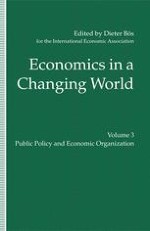1993 | OriginalPaper | Chapter
Non-cash Income, Living Standards and Inequality: Evidence from the Luxembourg Income Study
Authors : Peter Saunders, Timothy M. Smeeding, John Coder, Stephen Jenkins, Johan Fritzell, Aldi J. M. Hagenaars, Richard Hauser, Michael Wolfson
Published in: Economics in a Changing World
Publisher: Macmillan Education UK
Included in: Professional Book Archive
Activate our intelligent search to find suitable subject content or patents.
Select sections of text to find matching patents with Artificial Intelligence. powered by
Select sections of text to find additional relevant content using AI-assisted search. powered by
The economic well-being of households is determined by their resources relative to their measurable economic needs. Economic resources include both cash and non-cash income. While after-tax cash income is the most widely employed measure of household economic well-being, it may exclude considerable amounts of resources received in a non-cash form. These include health care, education, housing, food and other subsidies from governments; production for own consumption by farmers, peasants and other individuals living mainly in rural areas and small towns; and in-kind transfers received from relatives, friends and others in the form of food, clothing and/or shelter. Moreover the distribution of these non-cash resources may vary systematically by population subgroup, thus affecting measures of relative economic well-being within and between households. They may also differ systematically by country. They almost certainly differ by regime, for example in the post-communist reforming socialist economies (RSEs) as compared with Western European and other Western nations.2
